Early Review: "The Avengers" is the Marvel movie to beat all comic-book films
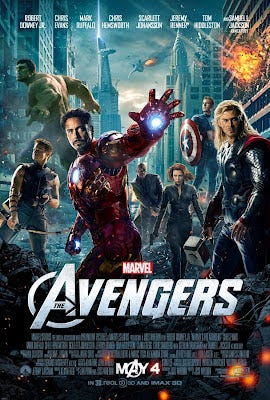
Film Rating: A
I’m still having trouble processing that I saw “The Avengers” tonight.
It’s not just that I’ve been waiting for this movie for four years, ever since Nick Fury first told Tony Stark about the ‘Avengers Initiative’ at the end of 2008’s “Iron Man,” but that the idea of making an “Avengers” film is, in and of itself, so spectacularly absurd that I’m struggling to accept that the movie even exists. Think about it. Four comic-book superheroes originating in four separate film franchises, each rich with their own characters and mythologies, each made with specific voices, tones, and styles, and each required to stand on its own as a quality solo adventure while simultaneously putting the pieces in place for the ultimate team-up. And that’s all before the actual team-up movie is made.
The goal Marvel set for themselves has to stand as one of the greatest challenges in the history of filmmaking, but having finally set my eyes on “The Avengers,” I can say with the utmost sincerity that this ludicrous four-year, six-film experiment was absolutely worth the effort. “The Avengers” is a work of blockbuster art, over two hours of non-stop, glorious payoff, filled to burst with genuine surprises that no amount of anticipation can prepare you for. To my eyes, it all comes down to Marvel’s ingenious hiring of writer/director Joss Whedon (“Buffy,” “Dr. Horrible,” “Firefly”). He’s one of the only people in the industry I would call a true auteur – someone whose work is instantly recognizable, thematically unified, and deeply personal – and the single greatest surprise behind “The Avengers” is that a Hollywood studio gave him upwards of $200 million dollars not to make a generic superhero blockbuster, but to make the ultimate Joss Whedon movie. Even though he’s working with several established franchises on a mammoth summer tentpole, “The Avengers” stands as one of the purest distillations of Whedon’s talents, interests, and voice in his entire career, and that, more than anything else, is what makes the film soar. Continue reading after the jump…
Examining the greatest strengths of Whedon’s prior work tells you everything you need to know about why “The Avengers” is a creative success. Stylistically, Whedon likes to combine genres and sensibilities (i.e. westerns and space travel) while reveling in the absurd (i.e. teenage girl fighting vampires) with heartfelt sincerity; he creates large ensembles of three-dimensional characters and rarely gives any of them the short shrift, and has always been thematically fascinated by the way people’s weaknesses and differences make them strong when put in a group. In short, he likes to explore unusual family structures, and combined with his love of comic books, I can imagine few greater projects for him than “The Avengers.”
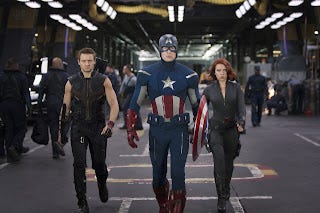
It is, unequivocally, a story about family, even if only two of the characters are related by blood. “The Avengers” is set in the Marvel Cinematic Universe established in the “Iron Man” films, “The Incredible Hulk,” “Thor,” and “Captain America.” When Loki, vengeful brother of the Norse thunder god Thor, comes to Earth with the intent to impose his reign on mankind, a desperate Nick Fury – leader of covert ops agency S.H.I.E.L.D. – tries banding earth’s mightiest heroes together: Tony Stark (Iron Man), Bruce Banner (the Hulk), Steve Rogers (Captain America, recently awoken from a 70-year ice slumber), and some of his own agents, including Natasha Romanoff (Black Widow) and Clint Barton (Hawkeye). Thor, following his brother to Earth, joins in on the action as well, and the film is all about how these divergent personalities must come together to save the day.
The team-up makes for some tremendous and groundbreaking action, of course, but what makes “The Avengers” a truly great movie, rather than just a fun one, is how Whedon utilizes this opportunity to create an engaging, in-depth character study. He has a brilliant handle on every inch of this universe, giving each character and their related mythology a unique tone and weight; when the Avengers all walk into a room, it really feels as if they’ve each stepped in from a different movie, and with those distinctions established, Whedon goes to town letting these personalities clash. The second act is largely a series of beautifully written dialogues between the characters, where Whedon explores how each member of the team plays off of others; through these interactions, we learn volumes about who these people are, so much more than we would if they were each flying solo. That sounds counterintuitive, given the sheer number of larger-than-life characters on display, but no major player is ever cut short, and they each undergo a palpable, effective arc of growth by uniting.
Their interactions are also, of course, hysterically funny. “The Avengers” is not technically a comedy, but it elicits more laughs than the actual genre often does. It’s all part of Whedon’s voice: his dialogue is quick, snappy, and filled with winking one-liners, and it naturally produces laughs even in the darkest of circumstances. “The Avengers” obviously has a lot of humor built in – there’s something inherently funny, for instance, in putting Tony Stark and Loki, God of Deceit, on-screen together – but Whedon never once goes for the cheap joke. If he wants to make us laugh, it always rises out of organic character interactions, and in that way, the humor never interrupts the character development. In truth, the two are one and the same; “The Avengers” is the rare movie where each laugh is genuinely insightful.
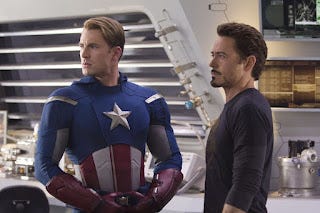
I honestly can’t say enough good things about the character work on display here, but instead of speaking in generalities, let’s look at the cast: Robert Downey Jr. is as perfect as Tony Stark as he’s always been, and I really like what he and Whedon have done with the character here. All the work Tony did to overcome his demons in “Iron Man 2” is honored, meaning he’s actually a pretty calm, happy guy this time around. He’s still snarky and narcissistic, but much more down to Earth, and that adds engaging new dimensions to what could become a one-note persona. Chris Evans’ Steve Rogers, meanwhile, is in a much darker place at the start of the film, having awoken to a world so vastly different than the one he remembers. Whedon and Evans have great fun playing with Cap’s lack of knowledge about modern culture and customs – there is one astonishingly edgy joke in this vein that I’m surprised, albeit delighted, they got away with – but there’s a strong undercurrent of sadness to his situation, and Evans is fantastic illustrating the character’s evolution. I can’t say Whedon does anything too new with Thor, except for wisely heightening the Shakespearean aspects of his speech patterns, but I adore the way the character is utilized, and Chris Hemsworth is just an absolute blast to watch.
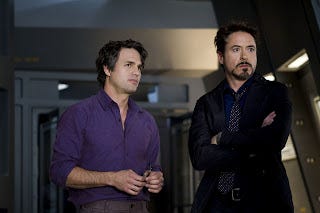
Mark Ruffalo takes over for Edward Norton as Bruce Banner, and I’m happy to report that he’s the best cinematic Banner yet; Whedon basically ignores “The Incredible Hulk” film and treats Ruffalo as a new character, a decision that pays off in spades. It gives Whedon and Ruffalo license to reinvent Bruce and dive deeper into his fractured psyche, and he’s quickly established as one of the most fascinating members of the cast. His Hulk alter-ego, meanwhile, is such a massive step-up over every other Hulk incarnation that it makes me retroactively dislike how the Norton film handled the character. This Hulk has as much personality as any of his Avengers teammates, and Whedon implements the creature with gleeful, reckless abandon. The Hulk is at the center of the most shocking, hilarious sequence in the movie, and you can practically hear Whedon cackling with manic joy behind the camera as it happens.
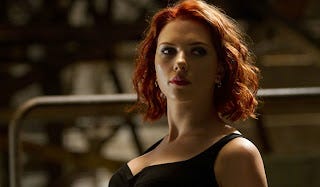
Scarlett Johansson’s Natasha Romanoff – Black Widow – gets some of the most impressive character work; Whedon obviously has an amazing talent for writing strong female characters, and the amount of layers he adds to Romanoff in her first scene alone is staggering. She’s just as fascinating and complex as any of the boys this time around, and Johansson absolutely rises to meet the challenge. She’s so good reciting Whedon dialogue, in fact, that I would love to see the two collaborate on an original project in the future. Rounding out the Avengers themselves, Jeremy Renner’s Hawkeye is the least developed member of the team, but Whedon’s writing is so sharp and Renner’s performance so confident that he still feels like a fleshed-out, three-dimensional member of the ensemble. And he kicks unholy amounts of ass, so there’s that. Clark Gregg’s Agent Coulson, an unlikely but understandable fan favorite from other Marvel movies, returns in his best appearance yet, and Samuel L. Jackson’s Nick Fury is just as Samuel L. Jackson-y as ever.
But the standout member of the cast is Tom Hiddleston, who, as Loki, simply steals every scene he’s in, just as he did in “Thor.” His time in exile has made him bitter, savage, and bloodthirsty, and the unhinged look in Hiddleston’s eyes is positively terrifying; at the same time, his intelligence, wit, and cunning are all sharper than ever before, and the way he psychologically torments the Avengers team during the second act provides a master class in writing and performing a villainous character.
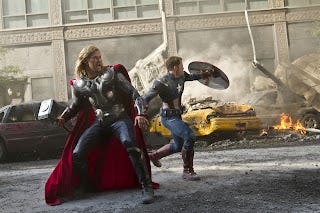
The perfect cast, fantastic writing, and healthy thematic undercurrent would be enough to make “The Avengers” a success in my book, but where the film rises above its Marvel predecessors is in the action, which as I noted above, is unbelievable. It’s like nothing you’ve ever seen before, with Whedon utilizing all the different styles and strengths of the various superheroes to create set-pieces larger and more thrilling than any I’ve ever seen in a comic-book movie. The third act is essentially one giant action sequence, and it may be the greatest, grandest finale I’ve ever witnessed in a summer blockbuster. One of Whedon’s trademark long takes appears here, the camera moving throughout the war-torn city to show us where each of the Avengers are, what they’re doing, and how it relates to everyone else, a moment that succinctly sums up everything this film does right. The cinematography is fabulous from start-to-finish; I especially love Whedon’s use of bright, primary colors. It’s just another way he embraces the story’s comic-book roots, rather than shying away from them. I must note, however, that the visuals are absolutely destroyed by the 3D conversion process if you elect to see it in that format. The 3D is blurry, dark, and adds nothing to the experience.
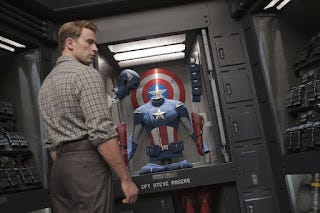
I can’t wait for the film to come out so I can catch a superior 2D screening, but I’m also eager to revisit the film just to convince myself that it actually exists. I’m starting to come to terms with all the impossibilities that led to making the film, and now I just have to believe that all the wonderful things I saw on screen tonight weren’t just figments of my imagination. “The Avengers” is an honest-to-God unpredictable experience, similar to “The Cabin in the Woods” (another Whedon production) in its number of ‘holy-hell-how-are-they-doing-this-right-now?’ moments. That’s something big studio films so rarely achieve these days, and the wildly refreshing nature of “Cabin” and now “The Avengers” is what cements these pictures as my favorite films of the year so far. Hopefully this tremendous one-two punch will finally push Whedon into the mainstream, but no matter what, I can’t wait to see what he does next.
“The Avengers” will open nationwide on Friday, May 4th.

